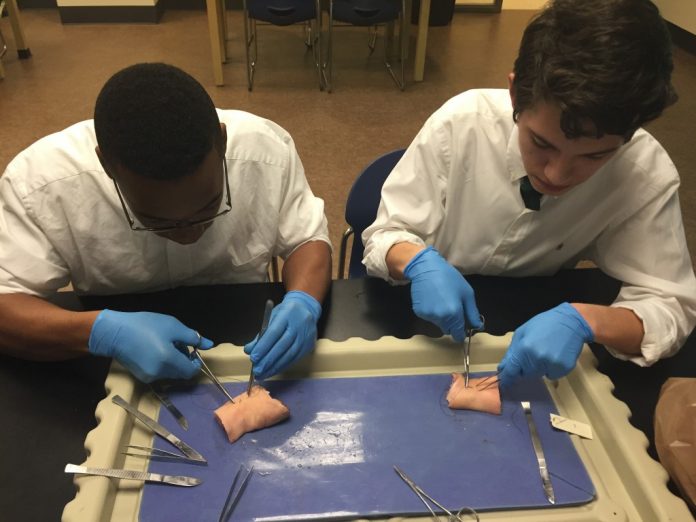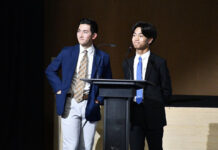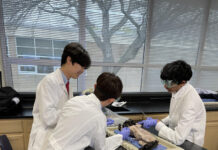This 2016-2017 school year is a big one for the Jesuit Medical Society.
So far, they’ve introduced two new courses this year on top of the pre-existing cat dissection and structure function classes. The two new courses which were introduced this year are the organic chemistry class and the microbiology and infectious disease class. On top of that, the Medical Society will be having its first ever banquet as well, and lastly to tie the knot on the new improvements for this year, three new committees have been introduced: the service committee, the banquet committee, and the apparel committee, all of which will be made up of students.
Many students may ask themselves, why is the Medical Society important? Or why should I care about the Medical Society and what they do? Well, for the students that may ask themselves this, the answers to those questions for them lies in their delight and satisfaction with the Medical Society and the vast world of medicine. For many, the society provides a window of opportunity into the not so distant future for them after they leave Jesuit, and even college. For others though, the society provides a means of interacting and bonding with fellow Jesuit brothers outside of the typical classroom environment.
For those who are truly interested in seeking a career or occupation in the medical field, the Medical Society provides students with the chance to be a part of Clinical Rotations. Clinical Rotations are basically days in which the participants in the course are given the chance to “shadow” doctors or lend a helping hand to the doctors as they progress through their daily routines. Those enrolled in Clinical Rotations meet periodically on designated Fridays dressed in their Jesuit Medical Society scrubs to travel over to Dallas Presbyterian Hospital, where they then each go to shadow their own doctor or give aid wherever it is needed. These rotations can range from a day of cleaning and being a doctor’s assistant to being a part of a real life surgery on an actual person, even if it is just handing tools to the doctor as he does his thing.
Additionally, for the students that are maybe seeking a career focused more on medical research aspect than the hands-on work as a doctor, surgeon, or nurse, the STARS program might be of interest. Recently participating seniors in the STARS program Erik Sanchez 17’, Joe Carver 17’, and Noah Sherer 17’ gave presentations on their findings and research on specific virus’ or diseases that came from their research over the summer.
The Medical Society creates a seed in the minds of those involved in it, allowing the seed to flourish into something much greater than just a hobby or interest.
Mr. Von Schlehenried, co-director of the society, says the most important aspect of the Medical Society is “learning how medicine is a service/vocation” and also how it gives guys “a chance to see what it’s all about so they can decide if it’s something they want to keep pursuing.”
The Medial Society has greatly impacted the lives of many, evident in the President of Medical society Matthew Brewer 17′, who distinctly recalls discussing the Medical Society in his 8th grade interview at Jesuit. He came across the Medical Society table on preview day and he had heard positive reviews from previous graduates of the society. He claims that the Medical Society was “one of the deciding factors that made [him] come to Jesuit.” Matthew also said his favorite part of the Medical Society was being the president, and also added that the most important thing about the society is that “it’s inclusive to all grades and ages, and you can participate from freshman to senior year, which gives kids a chance to get involved early and stay involved, there are activities for every grade level, as well as speakers from different fields of the medical industry, such as the business side.”
Matthew has greatly enjoyed his involvement with the Medical society during his almost 4 years at Jesuit, but there was one incident that really stood out to him during his time in the Medical Society.
“Last year during my hospital rotations as a junior, I got lost in the hospital and ended up in the operating room, where they let me chose what surgery I wanted to shadow. I’m interested in orthopedics, so I chose to shadow a double shoulder replacement, where I saw two new socket implanted into a man’s shoulder joints,” and even went on to say that “I even got blood on my scrubs.”
All in all, the Medical Society is a place for everyone that may be interested in careers in the medical field, or even if you just have a fascination for the sciences, you can pick and choose what is interesting to you. The medical field is most definitely not for everyone, and along with it’s life saving moments, or even bringing life into the world, it has it’s “downs” and Matthew noted that he had even witnessed a man pass away in the ER as the doctors worked at trying to save this man’s life while making chest compressions. Though this certainly wasn’t one of his highlights in the society, he claimed that “it was an insight into the tragic side of medicine, but it was a good experience to have since I do want to pursue becoming a medical professional one day.”
Every profession has its ups and down, and for those in the field of medicine, the ups are high and the lows are low; however, no matter the result it is a vocation that can be very noble.
If you’d like more info or coverage on the Medical Society, stay tuned to The Roundup, pr contact Mr. Von, Mrs. Boyle, or Mrs. Sanchez.






